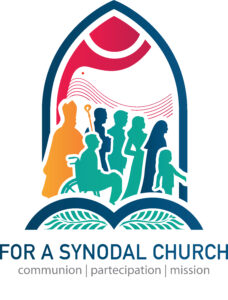
A priest working with Salvadorans fleeing poverty and gang violence speaks to a family on the Mexican border. Image: Shutterstock.
In the first of two articles, Fr Tom O’Reilly explains why synodality means listening to voices on the periphery as we journey together as a Church.
Pope Francis is convinced that the path of synodality is God’s wish for the Church of the third millennium. Synodality has many dimensions, but its basic meaning is ‘journeying together.’
The Pope often says that the Church must go to its own peripheries and those of society in general, where it can rediscover its true identity by listening to those on the margins.
In the Acts of the Apostles, we learn how the early Jewish Church was transformed by its experiences of meeting those outside its own circle. We first consider Peter’s call to go to the house of the Gentile Cornelius and how that raised questions for the Church’s identity and mission (Acts 10:1-11:18).
In the following article, we will see how these questions led to crucial decisions at the Council of Jerusalem in the wake of Paul and Barnabas’ missionary outreach to the margins (Acts 15:1-35).
The Cornelius episode is a great drama in which God directs his plan of salvation for all people without distinction. Cornelius, the Gentile God-fearer on the margins of the Jewish religion, responds immediately and without question to God’s promptings.

Image: Shutterstock
By way of contrast, Peter, who had just been visiting newly-established Jewish Christian communities, is finding it very hard to understand and keep pace with what God is doing. He moves slowly from resistance through confusion to conviction about God’s designs.
We usually understand this episode as the story of Cornelius’ conversion. But it is equally the story of Peter’s conversion, that is, his turning to and acceptance of what God is doing in unexpected ways and in ritually unclean places.
Peter has to be converted from a mind-set deeply ingrained by his Jewish cultural and religious identity. His conversion is brought about through God’s direct intervention in a vision, by the Spirit’s action, and by listening attentively to Cornelius’ experience of a heavenly messenger.
Notice how Peter, who had been told by the Spirit to go with the messengers from Cornelius, first pauses to listen to what they had to say. When he arrives in the house of Cornelius, he first speaks of his own initial resistance to God and then listens and learns as Cornelius relates his own religious experience.
Only then does Peter preach the Good News of Jesus Christ to Cornelius and his household. The initiative of God is again highlighted by the descent of the Holy Spirit even before baptism, which convinces Peter that Gentiles are having the same experience that he and other Jewish believers had at Pentecost.
When Peter returns to the Jerusalem church, he is strongly criticised by some for transgressing strict religious boundaries and associating with ritually unclean Gentiles. Peter does not debate points of law with them but simply shares his experience at the periphery. He identifies with his critics by saying that initially he too strongly objected to any transgression of traditional practices.
But God led him to a Gentile house where he listened to others and discovered the presence and action of the Holy Spirit in an ‘unclean’ place. As the community listens to Peter, objections are replaced by praise for God’s marvellous and unexpected deeds among the Gentiles.
When the followers of Jesus were in danger of remaining a closed ethnic group, the Cornelius episode led them to recognise their identity as an inclusive community, open to all races, cultures and classes. This event challenged the view that the activity of God’s Spirit is confined within the limits of one’s own tradition.

Image: Shutterstock
And it also reminded leaders at the centre that they do not have a monopoly on the experience and guidance of the Spirit. Rather, God chose the peripheries as the place of his saving presence and, in discerning where the Spirit is leading the community, we must always listen to people on the margins.
Today we are trying to recover our identity as a synodal Church, an inclusive Church guided and empowered by the Holy Spirit, as we journey together on our common missionary path. This means listening to voices on the peripheries through which the Spirit speaks today, such as the voices of minorities, migrants, victims of injustice and racism, and those who are excluded in present social and economic systems.
We must also listen to the voices of those who can easily be marginalised in a clerical Church – laity in general and women and young people in particular, ethnically different minorities, Catholics who no longer practice their religion, victims of clerical abuse, and those in irregular moral situations. These are our companions on the journey as we walk the synodal path together.
Fr Tom O’Reilly is a Scripture scholar. He holds a degree in scripture studies from the Pontifical Biblical Institute in Rome and has lectured in St Columban’s Seminary, Navan, and in the Kimmage Mission Institute in Dublin. He also worked as a missionary in Pakistan and as regional director of the Columbans in Britain. His book, ‘Acts of the Apostles – A Reading for Mission Today’ is published by Veritas. www.veritas.ie
